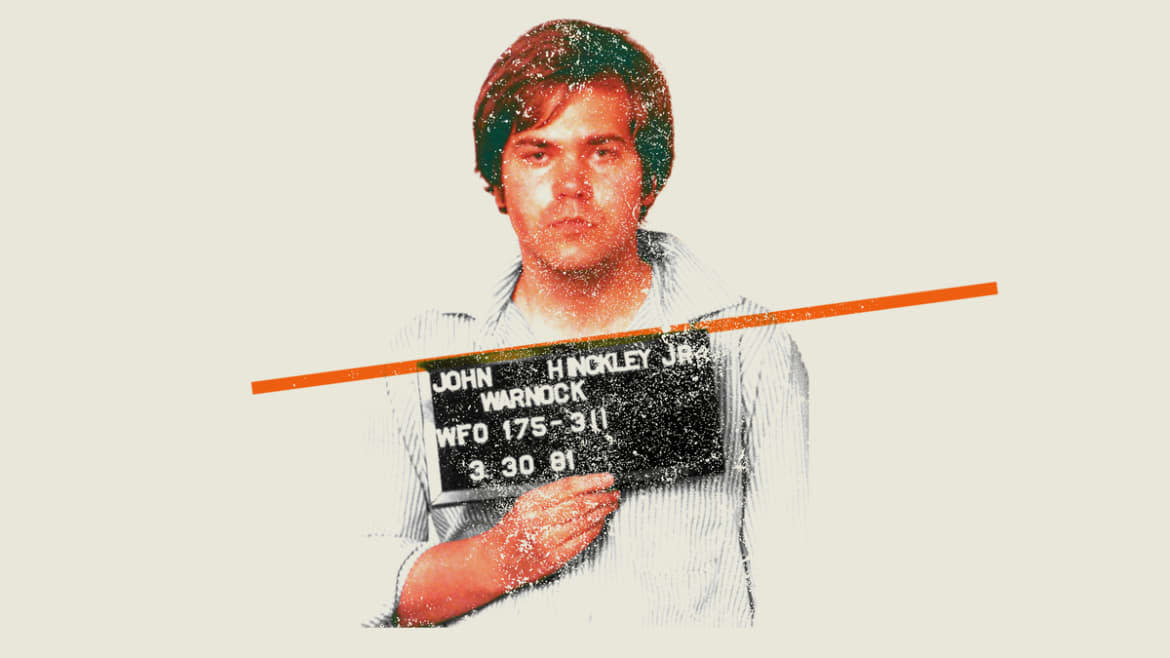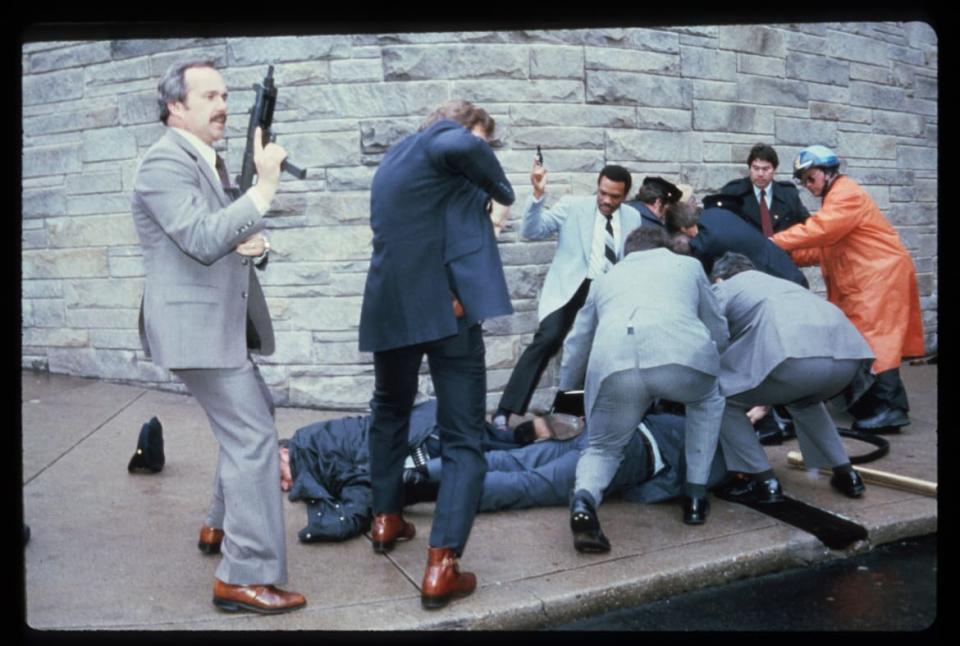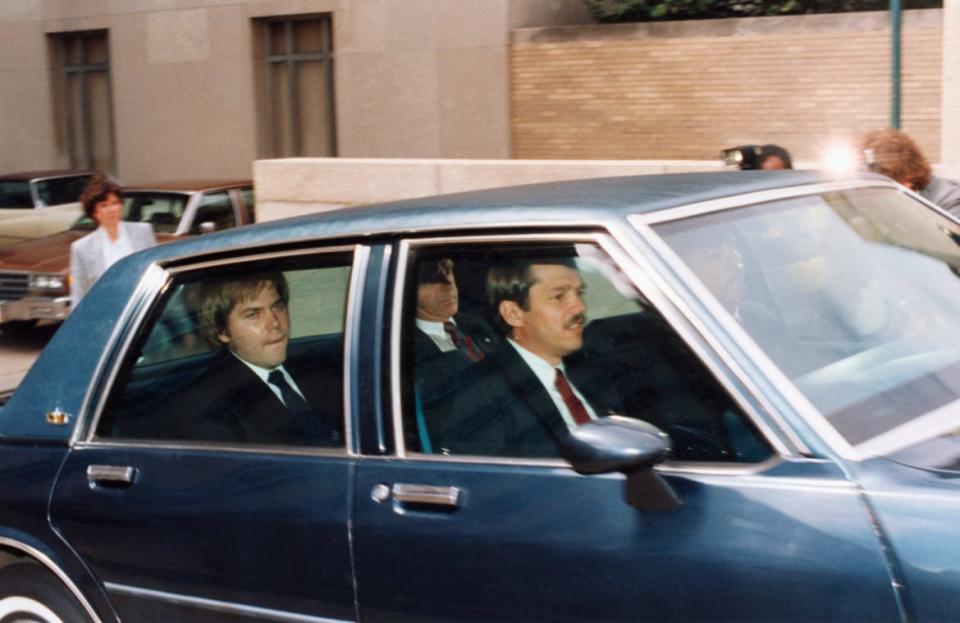John Hinckley Jr. Claims He Wants to Live a ‘Quiet Life.’ But Does He?

- Oops!Something went wrong.Please try again later.
- Oops!Something went wrong.Please try again later.
- Oops!Something went wrong.Please try again later.
- Oops!Something went wrong.Please try again later.
John W. Hinckley, Jr. doesn’t want to talk about the day he tried to assassinate Ronald Reagan outside the Washington, D.C., Hilton in 1981.
He doesn’t want to talk about how one of the six bullets he fired left James Brady, Reagan’s press secretary, permanently brain-damaged and confined to a wheelchair for the rest of his life.
He doesn’t want to talk about Secret Service agent Tim McCarthy, whose diaphragm and liver were perforated by Hinckley’s fourth shot.
Or about Tom Delahanty, the D.C. Metro cop who took a bullet to the neck that day.
The only thing Hinckley wants to talk about, in fact, is himself.
In a 30-minute interview with The Daily Beast on Thursday morning, less than 24 hours after Hinckley was fully freed from court supervision after more than four decades, he refused to discuss anything other than the music career he’s now trying to get off the ground. He wouldn’t answer specific questions about the assassination attempt, current events, or the rudimentary gun control measures enacted in the U.S. due largely to his actions outside the Hilton.
“Only... my music and art,” Hinckley demanded.
The year after he shot Reagan, Hinckley was found not guilty by reason of insanity, and spent the next 34 years in a government-run psychiatric hospital in Washington, D.C. His early days of confinement were rocky, and Hinckley was caught writing letters to convicted serial killers Charles Manson and Ted Bundy. In 2016, Hinckley was allowed to begin living full-time with his ailing mother in Williamsburg, Virginia. There, he began selling “antiques, little knick-knacks, records, things like that,” to make ends meet under strict conditions.

Chaos surrounds shooting victims immediately after the assassination attempt on President Reagan, March 30, 1981, by John Hinckley Jr. outside the Hilton Hotel in Washington, DC.
That meant “no contact whatsoever” with the families or descendants of Reagan, Foster, Brady, Delahanty, and McCarthy, or with hospital pharmacist Jeanette Wick, who in 1997 accused Hinckley of menacing her.
Hinckley participated “successfully” in music, individual, and group therapy, and “exhibited no violent, disruptive, or problematic behaviors,” according to a 2021 court filing that included a report from one of his therapists. He began dating a woman he met in group therapy, but ended things when she became too demanding of his time, the filing said. Hinckley was required to hold down a job or work as a volunteer, but was turned down by four different organizations which apparently didn’t want the baggage and bad publicity that would have surely accompanied his hiring.
Dad Left Vile Note for Estranged Wife After Drowning Their Three Kids in a Bathtub, Prosecutors Say
So Hinckley rented a booth at an antiques mall in Williamsburg, where he worked between four and nine hours a day prior to the COVID pandemic. The court restricted his travel to a 75-mile radius around his home, and Hinckley sourced his inventory at flea markets, estate sales, and consignment shops within the approved zone. He brought home about $1,000 a month—an income stream that petered out when the antiques mall closed in April 2020 due to COVID.
At the same time, Hinckley struggled to get his musical career off the ground. All of his internet postings had to be approved by his treatment team, and in 2019, Hinckley’s music therapist, Nicole Drozd, made his songs available to the public on Soundcloud. However, very few people actually listened to Hinckley’s music on the platform. Drozd then suggested trying YouTube, and posted Hinckley’s songs for him there under an anonymous band name. Still, views remained low and Hinckley “expressed disappointment in the lack of feedback he was receiving,” according to the filing.
Hinckley doesn’t seem to have had a particular passion for antiques, telling The Daily Beast that he didn’t specialize in any one thing but simply looked for “something that I liked, and that I could buy cheap, and sell it, and try and make a profit.”
After a federal judge’s determination last fall that Hinckley, now 67, had been fully rehabilitated, Hinckley was granted an unconditional release which took effect Wednesday.
“I’m just trying to focus on the present, and I don’t want to delve back into the past, 30 and 40 years ago,” Hinckley said Thursday. “I’m not trying to draw attention to myself at all. I’m trying to live a quiet life, and get along with everybody.”
My original artwork is for sale now at https://t.co/jfl74o7mMv pic.twitter.com/HxnqCnACNe
— John Hinckley (@JohnHinckley20) January 21, 2022
But Hinckley’s words don’t exactly square with his actions, as he’s worked hard to heighten his public profile by forming a band, posting videos to his YouTube channel, selling his paintings online, and talking to reporters from his modest rental apartment in Williamsburg.
Hinckley, who is no longer confined to a 75-mile radius around his home, is also extremely disappointed that a concert tour he had booked for the summer, with sold-out dates in Chicago, Brooklyn, and Hamden, Connecticut, was canceled. The rug was “pulled out” from under him, Hinckley told The Daily Beast.
“I’ve had three shows canceled,” he said. “I had a show set up in Chicago, where we were selling tickets, everything was going fine. And then they canceled that show. And then I had a show in Connecticut set up, where they were selling tickets. And that show got canceled. So this Brooklyn cancellation is my third cancelation… I’m just assuming it’s something like, local backlash or something like that. They didn’t really send me an official reason.”
The 450-person Brooklyn venue, the Market Hotel, said in an Instagram post that it was “not worth the gamble on the safety of our vulnerable communities to give a guy a microphone and a paycheck from his art who hasn’t had to earn it, who we don’t care about on an artistic level, and who upsets people.”
Hinckley billed it as the “Redemption Tour,” and planned to play 14 original songs. He told The Daily Beast that the purpose of the aborted tour was to “show everyone that I’m a changed person from the way that I was back in 1981… I’m just trying to redeem myself through music and art… I do not recognize myself from back then. I’m a totally, totally different person.”

John Hinckley, Jr., accused of attempting to assassinate President Reagan, sits in the back of an official vehicle outside D.C. federal court.
On Thursday, Hinckley said he was getting bored of being asked “the same questions” all the time.
Asked if he would like to apologize to the families of any of the people he shot, Hinckley replied peevishly, “I’ve apologized already.”
In response to a question about his supposed desire to live out his days in anonymity while working to raise his public profile, Hinckley prevaricated, saying, “In Williamsburg, where I live, I’m trying to be under the radar. I’m also trying to have a music career though, so I’m trying to do both.”
Has Hinckley ever tried to contact any of his victims to ask for forgiveness? What is he doing, if anything, to make up for his crime?
“OK, that’s enough,” Hinckley said.
A big thank you to everyone who helped me get my unconditional release. What a long strange trip it has been. Now it’s time to rock and roll.
— John Hinckley (@JohnHinckley20) June 1, 2022
When Hinckley, the son of a well-to-do oil and gas executive, made the ill-fated attempt on Reagan’s life, the then-president had just finished delivering a speech to members of the AFL-CIO at the D.C. Hilton. As Reagan walked to a waiting limousine, Hinckley, who had become obsessed with the film Taxi Driver and later said he tried to kill Reagan to impress actress Jodie Foster, fired six shots from a .22-caliber revolver. In 1982, Hinckley bizarrely called the shooting “the greatest love offering in the history of the world.”
Hinckley’s therapists believe he has now been fully rehabilitated, according to court filings. Last September, a forensic psychologist who treated Hinckley reported that he was “doing exceedingly well,” and that he was “operating at a high level,” arguing that June 2022 would be an appropriate target date for him to be liberated.
The psychologist, Samantha M. Benesh, said in the filing that she was convinced that Hinckley’s diagnoses of major depression, narcissistic personality disorder, schizoid personality disorder, schizophrenia spectrum disorder, and psychotic disorder—which Benesh said was the “linchpin of…Hinckley’s overt expressions of violence in the past”—had “been in full and sustained remission for more than twenty-five years, and perhaps more than thirty-two years.”
C. Danny Spriggs, the Secret Service agent who put the handcuffs on Hinckley the day he shot Reagan, just hopes the medical professionals got it right.
“It could be very devastating if they didn’t,” Spriggs told The Daily Beast.
Spriggs, who retired in 2004, joined the Secret Service in 1976. After spending his first five years working out of the agency’s Albuquerque Field Office, Spriggs was selected to serve on Reagan’s protective detail.
Speaking by phone on Thursday night, Spriggs said he remembers March 30, 1981, “as if it was yesterday,” describing it as “something you don’t forget.”
“As you very well know, our system of justice allows people to rehabilitate,” Spriggs continued. “In this particular case, it played out that way. The decision makers have decided that it’s time. I don’t agree with that, but that is our system of justice.”
As the arresting agent, Spriggs was the one who transported Hinckley from the crime scene to book him into jail. In the car, Hinckley was “pretty stoic and didn’t say much,” according to Spriggs. And while it was “obvious” to Spriggs that Hinckley had severe problems, he said physicians later described a level of mental illness he hadn’t personally witnessed.
In a statement provided to The Daily Beast, the Ronald Reagan Presidential Foundation and Institute said it is “both saddened and concerned” about Hinckley’s unconditional release and plan to pursue “a music career for profit.”
“Mr. Hinckley is the man responsible for the attempted assassination of President Reagan and the shooting of three other brave men, one who eventually died of his injuries years later,” the organization said. “We strongly oppose his release into society where he apparently seeks to make a profit from his infamy.”
Reagan’s daughter—and sometime Daily Beast contributor—Patti Davis said in an email that she had “no intention of giving John Hinckley more publicity.” A rep for Ron Reagan, Jr. said the former first son was “not interested in talking about Hinckley.”
Jodie Foster’s publicist and agent did not respond to requests for comment.
Spriggs is interested to see how Hinckley’s release plays out, now that the court’s restrictions have been lifted. But even though Hinckley is no longer being supervised by a judge, that doesn’t necessarily mean the feds aren’t still keeping an eye on him.
As Spriggs said, “I’m not so sure that his file has been purged from the Secret Service indices, if you will.”
Got a tip? Send it to The Daily Beast here
Get the Daily Beast's biggest scoops and scandals delivered right to your inbox. Sign up now.
Stay informed and gain unlimited access to the Daily Beast's unmatched reporting. Subscribe now.

